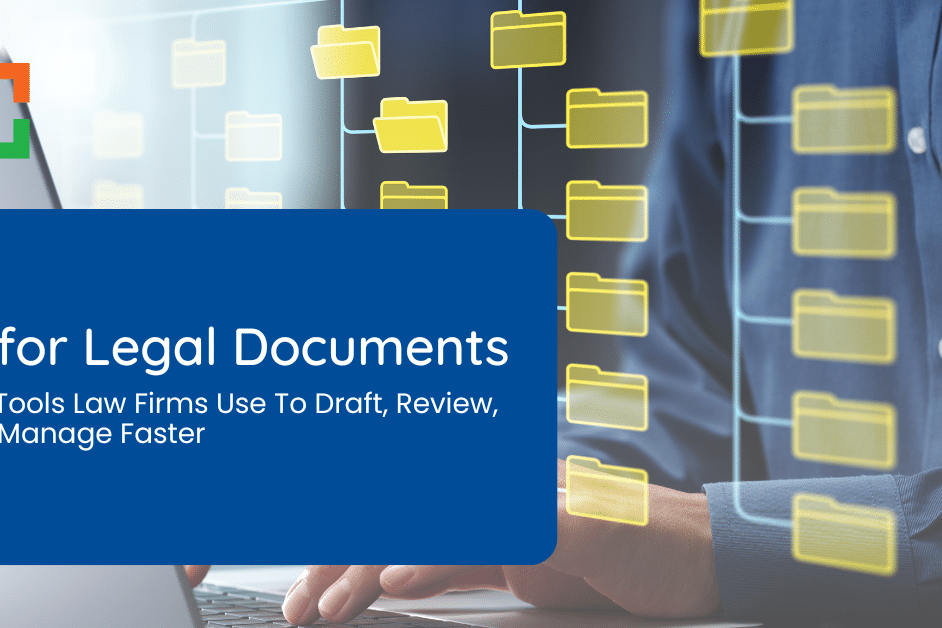Behind the Scenes of Legal Software Development

The legal technology landscape has long been underserved, particularly when it comes to document management systems (DMS).
While law firms rely heavily on DMS tools to organize and protect their digital assets, many existing solutions are clunky, outdated, or overly complex.
Enter LexWorkplace, a fresh take on DMS designed with modern law firms in mind.
In this article, we take a behind-the-scenes look at how LexWorkplace was developed, speaking directly with Dennis Dimka, CEO of Uptime Legal, to explore the journey of creating a cutting-edge DMS solution for legal professionals.
From early challenges to market insights, we’ll show you what it takes to develop software that truly meets the unique needs of law firms.
In This Article
- The Early Stages of Development: Identifying a Gap in the Market
- Building the Core Features: Focusing on Essentials
- Overcoming Developmental Hurdles: Scaling and Technical Challenges
- Iteration and Improvement: Listening to Users
- Testing, Quality Assurance, and Consistency
- The Future of LexWorkplace: Exciting Features on the Horizon
- Frequently Asked Questions
The Early Stages of Development: Identifying a Gap in the Market
When Uptime Legal began developing LexWorkplace, it wasn’t just about creating another document management system (DMS). The goal was to build a solution that addressed a clear gap in the legal industry: the overwhelming complexity and outdated technology of existing systems.
As Dennis Dimka, CEO of Uptime Legal, noted:
“Many law firms were stuck with DMS tools that weren’t built for the modern world—clunky, difficult to use, and lacking the integration capabilities firms need today.”
But Uptime Legal wasn’t just aiming to replace one DMS with another. They wanted to create a system that balanced the power and depth of legacy tools with the ease and accessibility of cloud storage platforms like Google Drive and Dropbox—solutions that are intuitive and easy to adopt. This vision meant thinking beyond what was available in the market and finding a way to make document management simpler, more collaborative, and better suited for how law firms actually work.
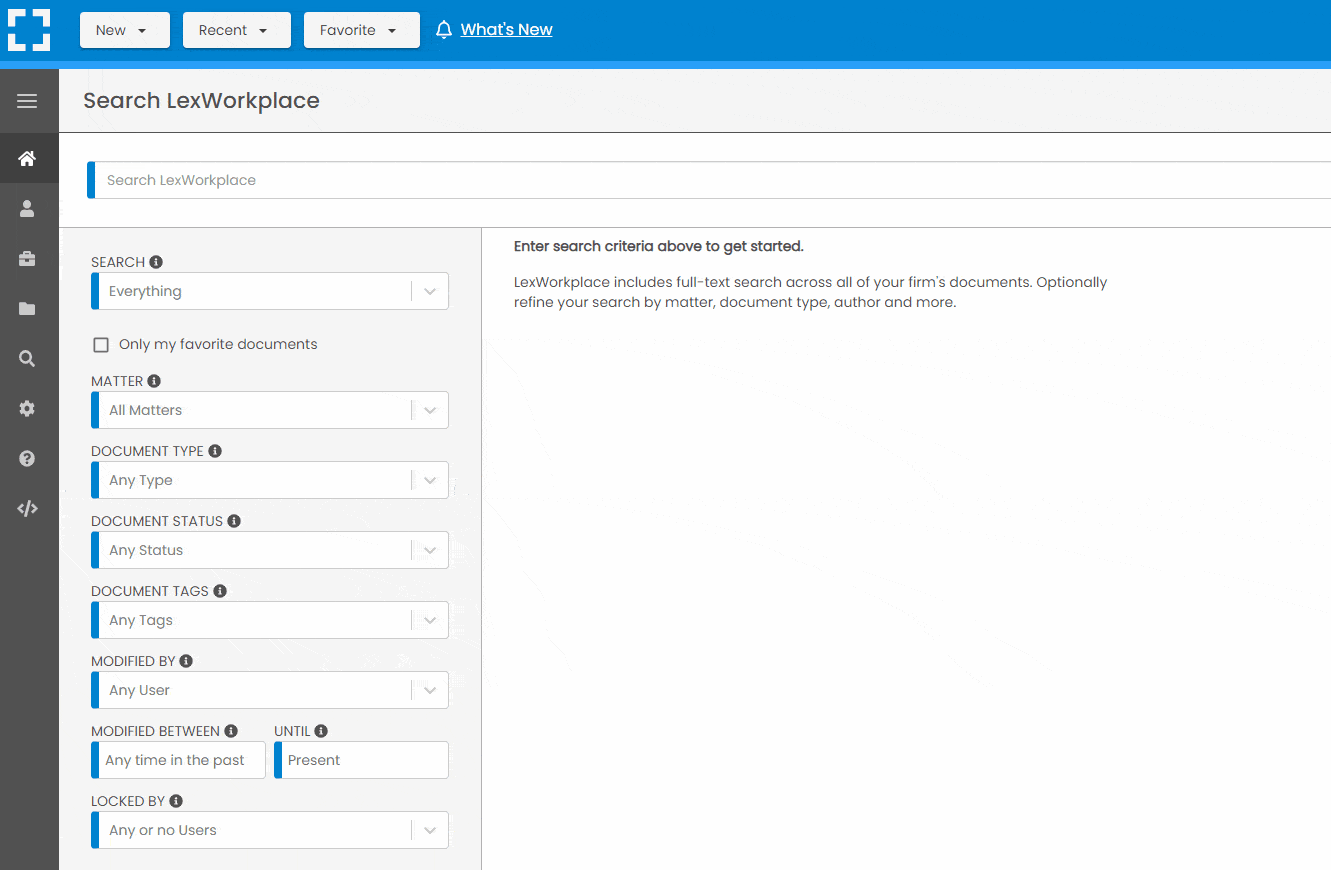
The development journey started with a pivotal decision: finding the right developer who could transform this vision into reality. Enter Adam Malone, the first developer behind LexWorkplace. With his experience in creating scalable, user-focused software, Adam played a critical role in turning what was a conceptual idea into a functional product. The team at Uptime Legal relied heavily on their expertise in providing cloud and IT services for law firms, using their understanding of the legal industry’s unique needs to shape the product’s core features.
What really set LexWorkplace apart in those early stages wasn’t just the technology, but how the team prioritized feedback from law firms.
Instead of assuming what the market needed, Uptime Legal used their deep understanding of the challenges law firms face—from managing sensitive data to integrating with existing practice management tools—to ensure LexWorkplace would be a solution that truly served their clients’ needs.
As Dennis explains:
“The development of LexWorkplace was driven by more than just a desire to improve document management—it was about creating a tool that would solve real, everyday challenges faced by legal professionals.”
By listening to user feedback and incorporating the lessons learned from years of IT service experience, Uptime Legal set out to build a system that didn’t just check the boxes of a traditional DMS but redefined what a modern DMS could be for law firms.
LexWorkplace Free Trial
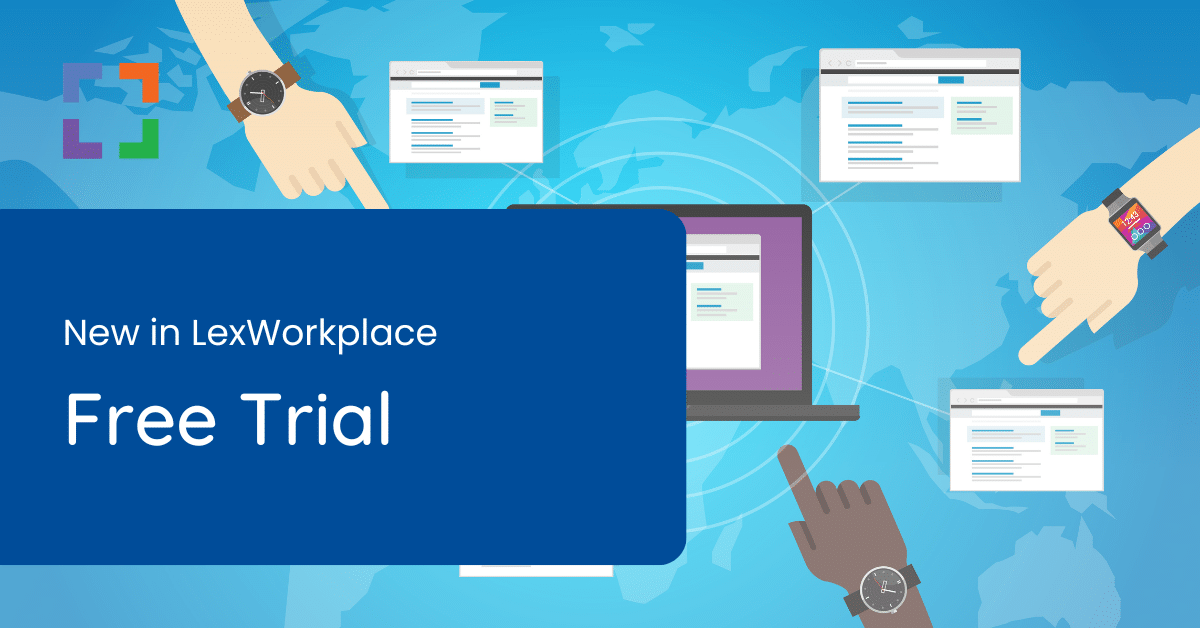
The free trial is finally here!
This highly-anticipated opportunity has now been fully implemented for users to learn the value of LexWorkplace.
Use this trial to:
- Upload Files
- Create Matters
- Organize Documents
- Integrate Emails
- Share and Collaborate
Ready to Try the Last DMS You’ll Ever Want?
Building the Core Features: Focusing on Essentials
When Uptime Legal set out to build LexWorkplace, the goal was clear: design a system that addressed the real needs of law firms while avoiding the complexity of legacy systems and the limitations of simpler options. According to Dennis Dimka, CEO of Uptime Legal:
“They saw a significant opportunity to create a DMS that was not only easy to use but also powerful enough to handle the complex requirements of legal work.”
The focus was placed on the essentials—features that law firms rely on daily but often find either too complicated or lacking in other systems.
“File organization, folder structures, and metadata management are the basics, but they’re critical for law firms managing legal documents.”
These core functions were made intuitive, so law firms could focus on their work rather than struggle with the system.
To stand out, LexWorkplace also introduced features that would directly impact law firm productivity. One example is the ability to save emails directly to matters, which eliminates time-consuming manual entry and ensures that communications are always linked to the right case. This kind of integration, Dennis notes, makes a real difference for firms looking to streamline their workflow.
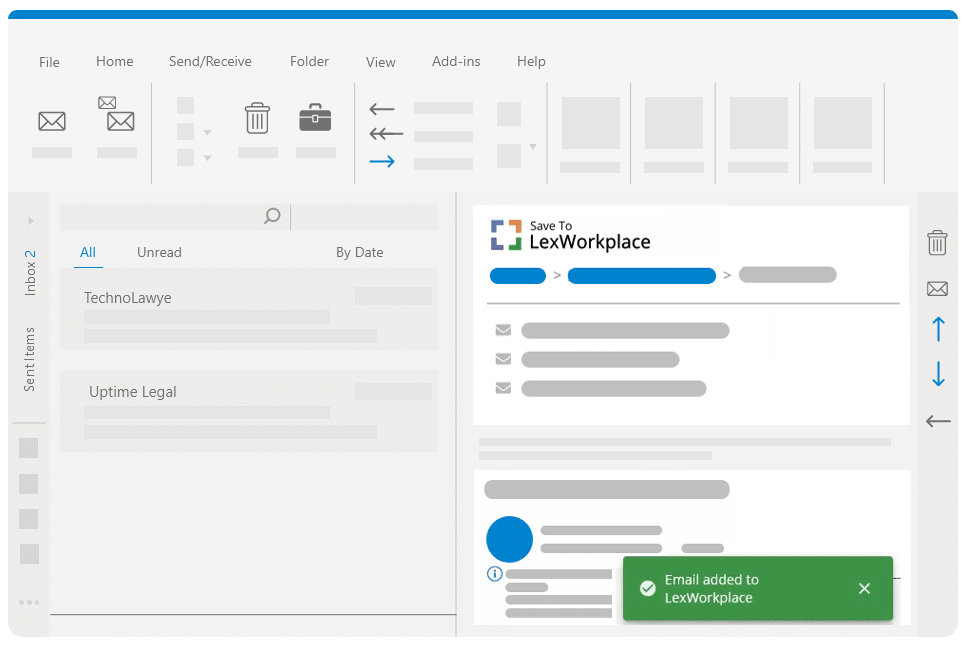
Search functionality was another key area of focus. Unlike many legacy systems that make finding documents cumbersome, LexWorkplace was built early on with fast and precise search capabilities. This allows users to quickly locate documents using metadata, file names, and other parameters, reducing the time spent searching and improving overall efficiency.
Understanding that law firms often rely on multiple tools, LexWorkplace was eventually designed to integrate seamlessly with systems like Microsoft 365, Clio Manage, and Litera Compare.
“A DMS shouldn’t exist in isolation”
By aligning LexWorkplace with the software law firms already use, the product becomes an integral part of their daily operations.
By focusing on these core features and ensuring ease of use, Uptime Legal created a solution that combines simplicity with the robust functionality law firms need to stay competitive.
LexWorkplace Top Features
Cloud-based Document Management
- Secure Cloud Storage
- Client/Matter-Centric Org
- Full-Text Document Search
- Secure Client Sharing
- MS Office Add-In
- Email Management
- Windows + Mac Compatible
- Automatic, Integrated OCR
Overcoming Developmental Hurdles: Scaling and Technical Challenges
As with any software product, building LexWorkplace came with its fair share of technical challenges. One of the early hurdles for Uptime Legal was ensuring the system could scale as the user base grew. Dennis Dimka explains:
“We needed a solution that would not only serve a small group of users initially but also scale to meet the needs of larger firms as they adopted the software.”
To tackle this challenge, LexWorkplace was built on AWS infrastructure, which provided the flexibility and scalability required to handle increased demand. Dennis further elaborates:
“By using AWS, we ensured that LexWorkplace could grow seamlessly, without the bottlenecks or downtime that often plague less scalable systems.”
This cloud-based infrastructure allowed LexWorkplace to handle the storage and processing needs of law firms, from small practices to larger, more complex organizations.
Another significant hurdle was designing a system that was simple for users but robust enough to handle the unique demands of legal document management. Early feedback from law firms revealed that many systems on the market either overcomplicated basic tasks or lacked critical functionality. LexWorkplace needed to strike a balance between these extremes. As Dennis notes:
“We wanted to create a system that wasn’t just another overly complicated tool but one that would help law firms get their work done faster and more efficiently.”
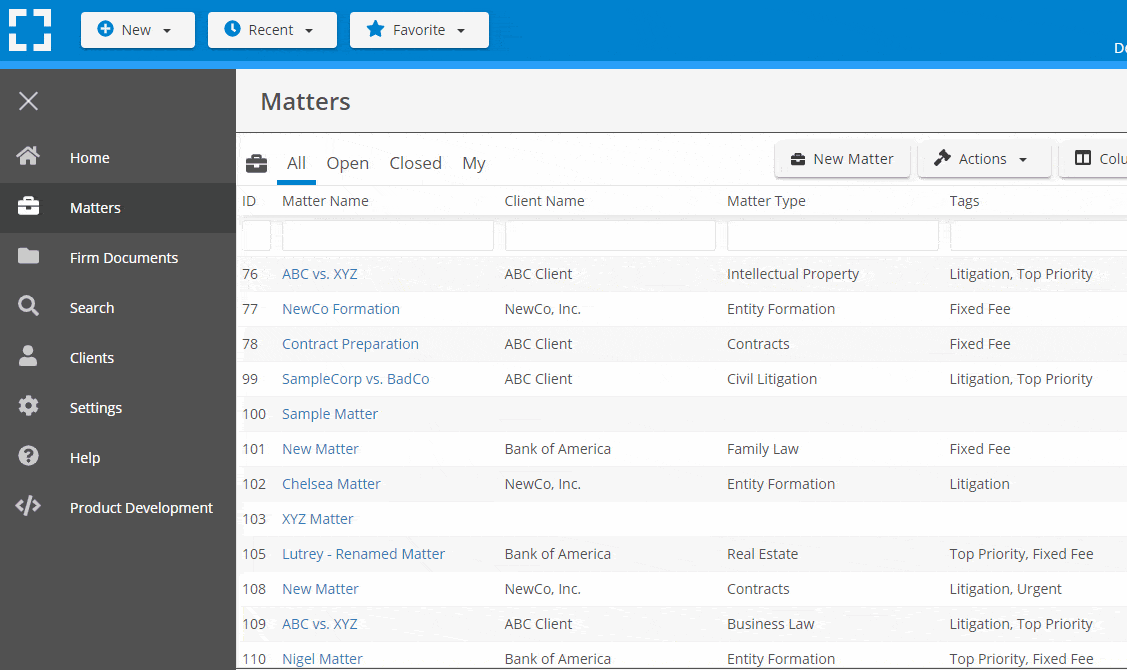
While the team faced these developmental challenges, the focus remained on delivering a product that was both reliable and easy to use. By prioritizing customer feedback and taking an agile approach to development, Uptime Legal was able to make ongoing improvements that better aligned the product with user needs.
Ultimately, Uptime Legal’s commitment to scalability and user-focused development allowed LexWorkplace to evolve into a DMS that not only meets the needs of law firms today but can also adapt to their future growth.
Iteration and Improvement: Listening to Users
From the very beginning, Uptime Legal knew that creating a successful DMS for law firms wasn’t just about building a product and hoping it would meet users’ needs. It was about building with the users—integrating their feedback throughout the entire development process. As Dennis Dimka, CEO of Uptime Legal, explains:
“User feedback has always been the backbone of our development process. Instead of guessing what law firms needed, we prioritized listening to them and adapting our product based on their real-world challenges.”
Instead of focusing only on adding new features, Uptime Legal made it a priority to improve existing functionality based on what users actually needed. Over time, they learned which features were essential and which were not, always keeping user preferences at the forefront. “Some features we thought were essential didn’t resonate as strongly with users as we expected, and that’s okay,” Dennis shares. “We learned quickly what was important to law firms and focused on improving those aspects of the product.”
A perfect example of this iterative approach is the development of LexWorkplace’s document search feature. Initially, search capabilities were good, but based on user feedback, the team refined it to meet law firms’ growing need for speed and precision. Dennis recalls:
“We saw how important search was to law firms, so we made it a priority to get it right. We didn’t just want a feature that worked—we wanted it to work well, fast, and in a way that made sense for lawyers who are under constant time pressure.”
By keeping the feedback loop tight and focusing on continuous improvement, Uptime Legal has been able to ensure that LexWorkplace isn’t just another tool—it’s a constantly evolving solution designed to adapt to the changing needs of law firms.
Testing, Quality Assurance, and Consistency
Testing is crucial to the development of any software, but it’s especially vital when building a product for the legal industry, where accuracy and reliability are paramount. For Uptime Legal, quality assurance was embedded into every stage of LexWorkplace’s development.
Dennis Dimka explains:
“We knew that building a system for law firms meant we had to get it right. We didn’t want to risk launching a product that wasn’t ready for the challenges our users face. So, we worked closely with early access users to test the system in live environments and make adjustments before going wide.”
The team didn’t rely solely on automated testing but also incorporated real-world feedback to ensure the system worked as intended in the environments law firms actually used. This hands-on approach ensured that any bugs or issues could be identified early, leading to smoother deployments.
While testing was crucial for bug fixes and system stability, Uptime Legal also focused on performance consistency. With law firms relying on LexWorkplace for critical document management, system downtime or slow performance could severely disrupt operations. To address this, Uptime Legal incorporated scalability into the product from the beginning, ensuring that LexWorkplace could handle firms of all sizes without performance degradation.
Dennis further explains:
“While automatic updates are great for ensuring consistency, we also make sure that each release is thoroughly tested. We prioritize stability in every update because we know our users rely on LexWorkplace for critical, everyday tasks.”
This commitment to testing and quality assurance means LexWorkplace remains a reliable, high-performance solution for law firms, ensuring that the product evolves without sacrificing its core functionality or user experience.
The Future of LexWorkplace: Exciting Features on the Horizon
As LexWorkplace continues to grow and evolve, Uptime Legal remains committed to maintaining the product’s quality and consistency. With new features being added regularly and user expectations always shifting, it’s essential to ensure that updates and enhancements don’t disrupt the system’s overall stability or user experience.
Dennis Dimka describes the long-term vision for LexWorkplace:
“Our vision for LexWorkplace goes beyond just being another DMS. We want to position LexWorkplace as the tech hub of a law firm—integrating seamlessly with all the tools and systems that firms rely on for their daily operations.”
To achieve this, Uptime Legal relies on a combination of automated and manual processes to monitor and maintain the software’s performance. Dennis emphasizes:
“Since LexWorkplace is a cloud-based SaaS, we have the advantage of rolling out updates automatically. This means our users are always working with the latest features, without any disruption to their workflow.”
Automatic updates help ensure that all users are on the same version, avoiding compatibility issues that can arise from having different versions in use across a firm. However, Dennis notes that maintaining product quality goes beyond just pushing updates:
“While automatic updates are great for ensuring consistency, we also make sure that each release is thoroughly tested. We prioritize stability in every update because we know our users rely on LexWorkplace for critical, everyday tasks.”
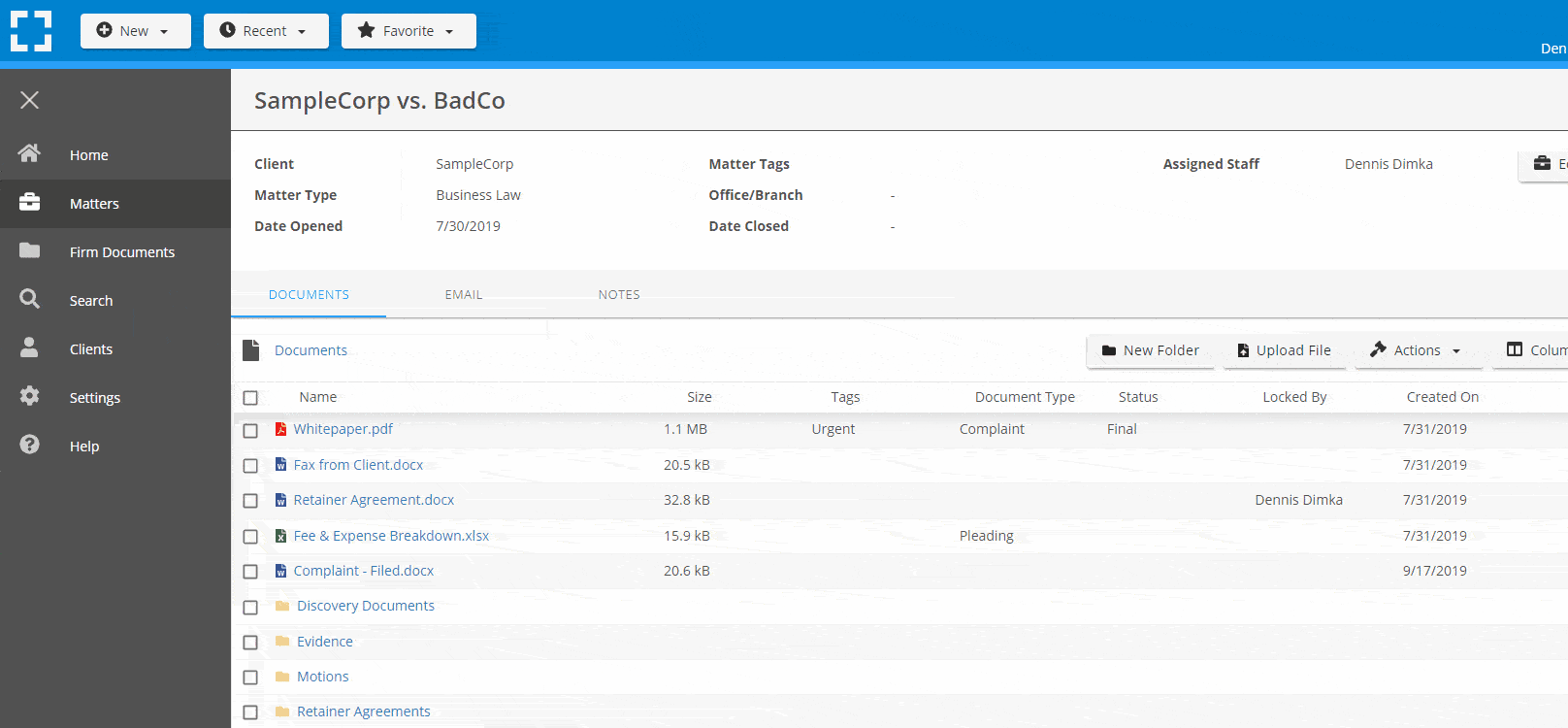
Maintaining reliability is especially crucial when it comes to the core features that law firms depend on. LexWorkplace’s foundational elements, like document management, search, and version control, must work seamlessly, even as the software expands with new features. “We made sure to build a strong, scalable foundation so that even as we add new tools, the core system stays solid and reliable,” Dennis says.
Looking ahead, Uptime Legal is focused on making LexWorkplace the central starting point for everything law firms do, streamlining workflows and enabling collaboration across different tools. “By continuing to integrate with the best-in-class software that law firms are already using, we can ensure that LexWorkplace is more than just a document management system—it’s the central hub that powers the firm’s operations,” Dennis adds.
Uptime Legal is also exploring new technologies that will allow LexWorkplace to expand its capabilities. For instance, the team continues to explore AI-powered document management tools, such as automatic tagging, smarter search, and even document analysis. “We’re taking our time with AI,” Dennis says. “We want to offer something that provides real value to our users—not just jump on the AI bandwagon for the sake of it.”
Additionally, Uptime Legal has taken steps to ensure that LexWorkplace can adapt to future challenges in the legal industry. With the recent launch in Canada, the company is focusing on data sovereignty and compliance to meet the growing demand for secure, compliant cloud-based solutions across different regions.
Through this commitment to consistent quality and continuous improvement, Uptime Legal has ensured that LexWorkplace remains not just a tool but a long-term solution that will grow alongside law firms, adapting to their evolving needs and the ever-changing demands of the legal industry.
Frequently Asked Questions
LexWorkplace combines the ease of use of modern cloud-based platforms with the robust features needed by law firms, such as metadata management, version control, and seamless integration with existing legal tools. It’s designed to be user-friendly while addressing the unique needs of legal professionals.
LexWorkplace integrates smoothly with popular legal software tools like Clio Manage, Microsoft 365, and Litera Compare, allowing law firms to continue using their existing systems while enhancing their document management capabilities.
LexWorkplace prioritizes security with features like data encryption, two-factor authentication, and role-based access control. These measures ensure that sensitive legal documents are protected and meet compliance standards.
Yes, LexWorkplace is designed to scale with law firms as they grow. Whether a firm is small or large, the platform can handle increasing document volumes and user numbers without compromising performance.
LexWorkplace is known for its user-friendly design, making it easy for new users to get started quickly. The platform is intuitive, and Uptime Legal offers comprehensive training and support to ensure smooth adoption.
LexWorkplace offers automatic versioning, allowing law firms to track and manage document revisions effortlessly. This ensures that previous versions are easily accessible and that changes are well-documented.
Yes, LexWorkplace is a cloud-based solution, which means it can be accessed securely from anywhere with an internet connection, making it ideal for remote and hybrid work environments.
LexWorkplace streamlines collaboration by allowing teams to share, edit, and comment on documents in real-time. This fosters efficient communication and ensures that all team members are on the same page.
Yes, LexWorkplace offers customizable features such as folder structures, metadata fields, and user permissions, allowing law firms to tailor the system to their specific needs and workflows.
LexWorkplace offers dedicated customer support through multiple channels, including phone, email, and live chat. The team at Uptime Legal is committed to providing timely assistance and ensuring that law firms receive the help they need to maximize their use of the platform.
Looking for Document Management Software?
LexWorkplace:
Modern Document Management for Law Firms
LexWorkplace is document & email management software, born in the cloud and built for law firms. Here’s a quick primer on how it works, or get your free trial to discover LexWorkplace for yourself.
Organize by Client & Matter
Organize documents, email and notes by client or matter. Store and manage all data for a case or project in one place.

Go Beyond Basic Files & Folders
Supercharge your firm’s productivity with true DMS functions.
- Version Management
- Document Tagging & Profiling
- Document Check-Out / Check-In
- Microsoft Office Integration
- Automatic, Integrated OCR
- Convert Word Docs to PDF
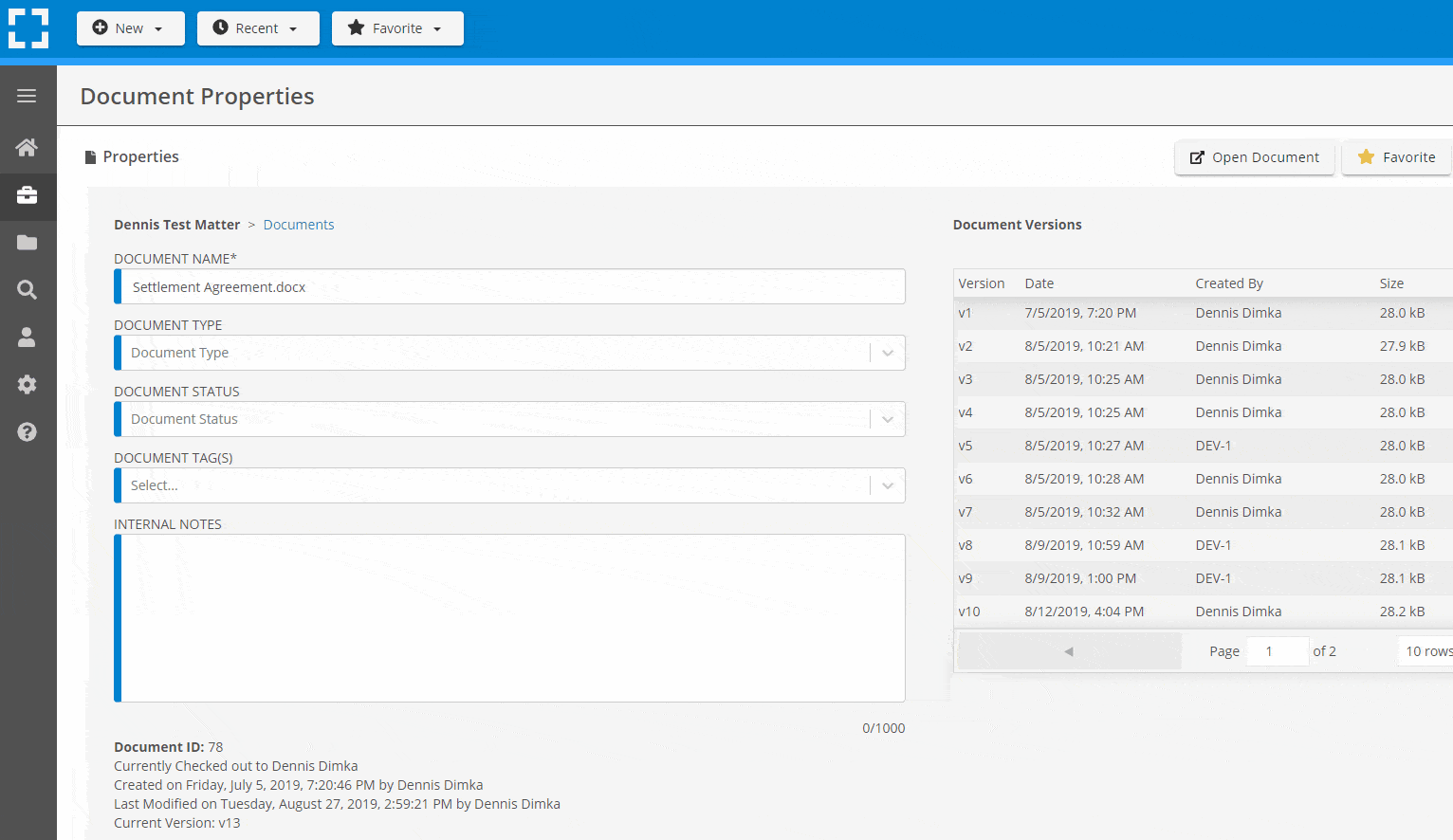
Search Everything
LexWorkplace is like Google for your law firm. Search across millions of pages, documents, folder email and notes in seconds. Refine your search by matter, document type, author and more.
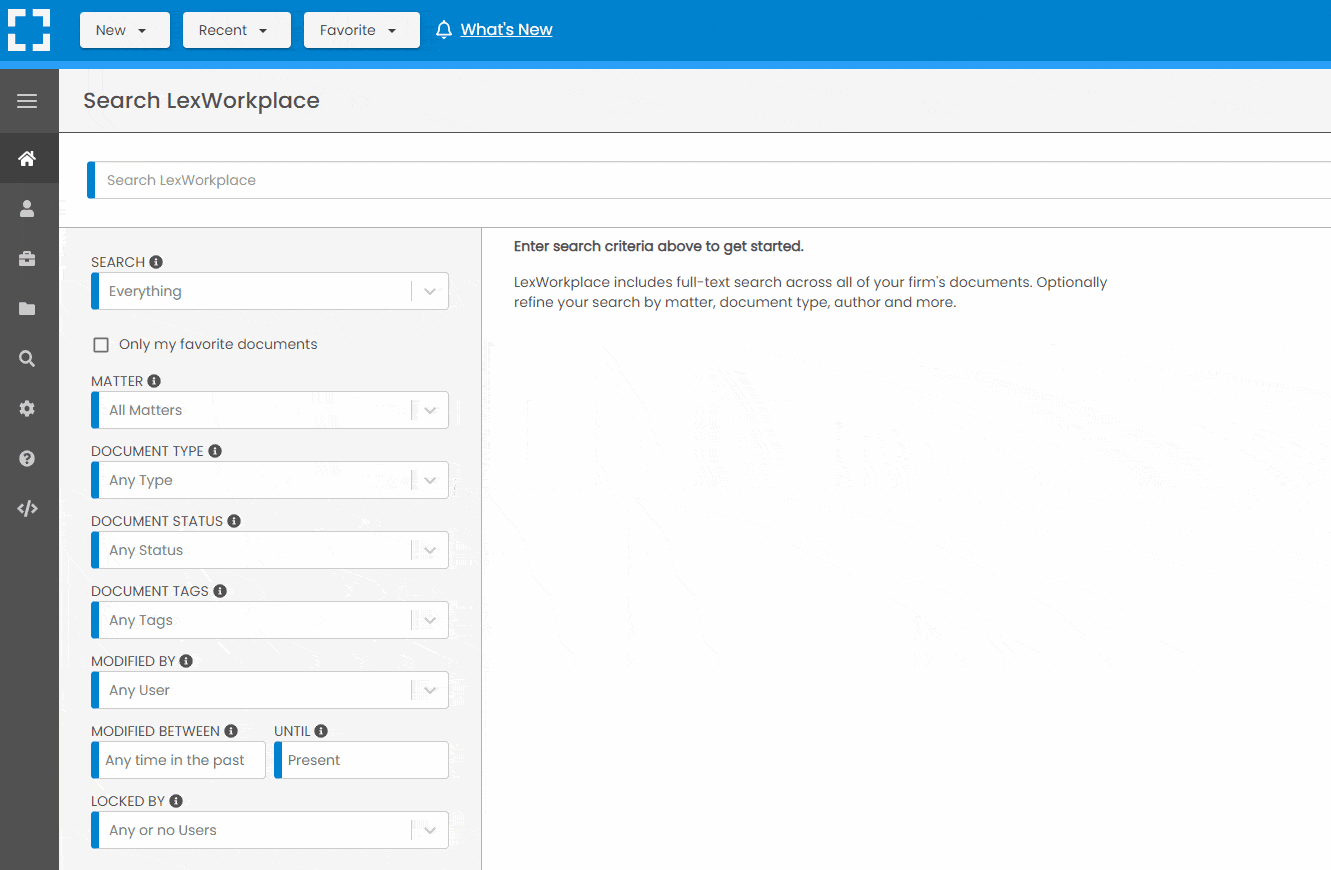
Search by…
- Client or Matter
- Document Type (Contract, Complaint, Order, etc.)
- Document Status (Draft, Final, etc.)
- Document Tags (Filed With Court, Fully Executed, etc.)
Outlook Integration + Comprehensive Email Management
Save emails to a matter without leaving Outlook. Saved emails are accessible to your entire team, organized and searchable.
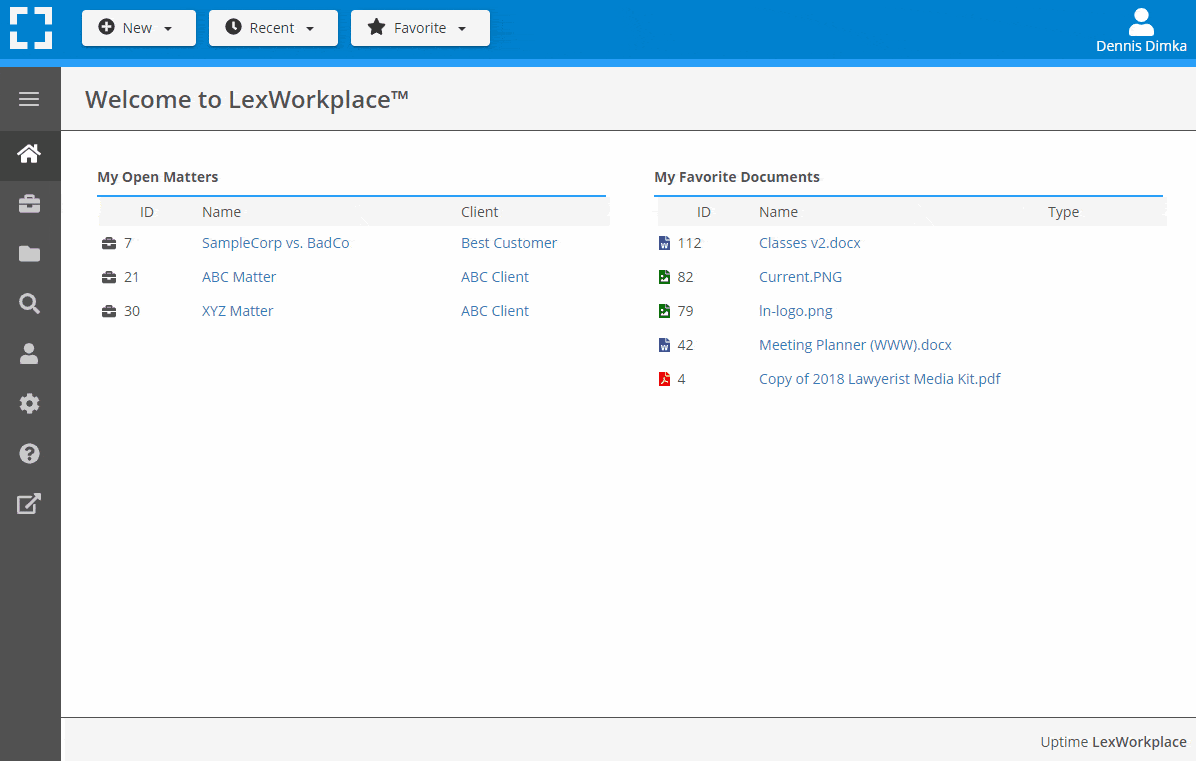
- Outlook Add-In that Works With Windows and Macs
- Save Entire, Original Email to a Matter in a LexWorkplace
- Email De-Duplication
- Organize Emails into Folders, Subfolders
Works with Windows and Macs
All of LexWorkplace is compatible with both Windows and Mac computers.
Next Steps
See What Clients Have to Say
Lawyers love LexWorkplace. See how the system streamlined one lawyer’s practice.
Watch the 5-Minute Demo
See LexWorkplace in action in our quick 5-minute overview and demonstration.
Or, if you want a one-on-one demo, or want to talk about LexWorkplace for your firm, schedule a call or demo below.
You Might Also Like
August 19, 2025
AI for Legal Documents: Top Tools Law Firms Use To Draft, Review, and Manage Faster
Struggling with slow legal document…
August 12, 2025
Why Law Firms Can’t Afford to Delay DMS Migration — And How to Switch Smoothly
Tired of costly, stressful tech…
June 23, 2025
Role-Specific Benefits of Document Management Software for Law Firms
Legal document management software…
Want More Legal Technology Tips?
Subscribe to Uptime Legal to get the latest legal tech tips and trends, delivered to your inbox weekly.
